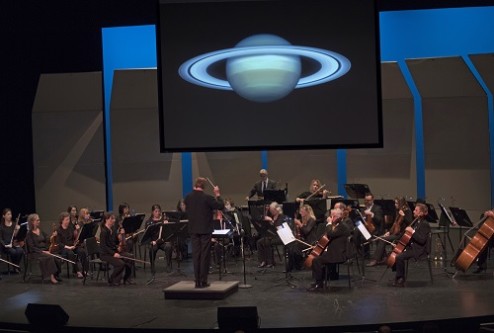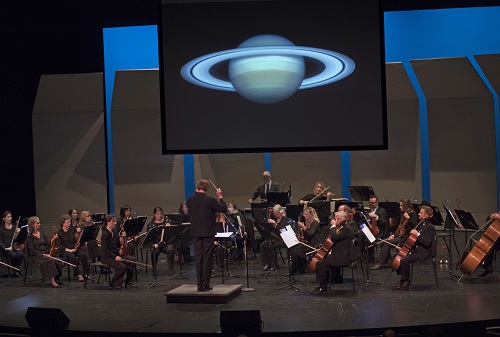 United States Mendelssohn, Mozart, Maxwell Davies, Febel, Preu, Saint-Saëns, David Bowie, Gabrieli, Monteverdi, Vivaldi, Mahler, Stravinsky: Soloists, Cincinnati Chamber Orchestra / Eckart Preu (conductor), SPCA Corbett Theater, Cincinnati, OH. 5-12-19.8.2017. (RDA)
United States Mendelssohn, Mozart, Maxwell Davies, Febel, Preu, Saint-Saëns, David Bowie, Gabrieli, Monteverdi, Vivaldi, Mahler, Stravinsky: Soloists, Cincinnati Chamber Orchestra / Eckart Preu (conductor), SPCA Corbett Theater, Cincinnati, OH. 5-12-19.8.2017. (RDA)

5 August
Mendelssohn – Symphony No.3
Mozart – Violin Concerto No.3
Peter Maxwell Davies – An Orkney Wedding, with Sunrise
(trad.) – Scotland, the Brave
12 August
Jean-Féry Rebel – Le Chaos
Hans-Peter Preu – Kepler’s Cosmos
Saint-Saëns – Piano Concerto No.2 in G Minor
Mozart – Jupiter Symphony
David Bowie (arr. Scot Woolley) – Space Oddity
19 August
Albinoni – Adagio in G minor
Gabrieli – Canzon quarta
Monteverdi – Sinfonie and Ritornelli from L’Orfeo
Vivaldi – Concerto No.3 in G Major
Mahler – Symphony No.5, Movement IV
Stravinsky – Pulcinella
Three concerts in August showed the talent and versatility of the Cincinnati Chamber Orchestra, in inaugural concerts with its new conductor, Eckart Preu. Felix Mendelssohn’s Third Symphony, the “Scottish,” is a superb vehicle for any orchestra, and and made the perfect opener for this year’s Summermusik. With concertmaster Celeste Golden Boyer leading the CCO’s strings, the CCO has never sounded more cohesive and assured.
In Mozart’s Violin Concerto No.3, Preu obtained perfect balance, offering clarity and elegance. The soloist, Angelo Xiang Yu, played with the grace and technical maturity of a much older artist.
The entrance from off stage of the superb bagpiper Karen May provided the first of two showy coups de théâtre in Peter Maxwell Davies’ An Orkney Wedding, with Sunrise, which ended the concert. The second stunner involved the entire Cincinnati Caledonian Pipes and Drums Band, marching on stage in full regalia to the tune of Scotland, the Brave.
In the second concert, titled Celestial Voyage in honor of the solar eclipse, the audience was invited on an interplanetary musical journey that began in the 17th century and ended in the 21st. The evening opened with Le Chaos, an excerpt from Jean-Féry Rebel’s ballet Les Elements. With Preu conducting from the harpsichord, the CCO brought flair to an elegant piece.
Concertmaster Amy Kiradjieff anchored the proceedings from a central spot on stage, as oboist Chris Philpotts, clarinetist John Kurokawa, bassoonist Hugh Michie, hornist Tom Sherwood, and trumpeter Ashley Hall gamely rotated around the audience. Their embodiments of Mercury, Venus, Earth, Mars, and Jupiter were aided by pre-recorded electronic sounds and projections. Afterward came the inherent theatricality of Kepler’s Cosmos by Hans-Peter Preu (brother of the conductor), and well served in an eloquent performance.
Camille Saint-Saëns would have been delighted with Ran Dank’s bravura playing of the composer’s Second Piano Concerto. The young pianist gave a masterful performance of this leviathan, mining every note for clarity rather than speed, and for quality rather than quantity of sound. Preu’s deft conducting produced exciting ensemble work from the CCO.
But they were even more masterful in Mozart, in a crisp reading of the Jupiter Symphony. Particularly fine filigreed playing came from the woodwinds and horns. Scot Woolley’s nifty arrangement of David Bowie’s Space Oddity made an unusual ending for the evening. Seated at an electric keyboard, Preu led the players in a cool, idiomatic reading.
On the third weekend of Summermusik, Cincinnati became a haven for Baroque music, in the CCO’s Venetian Madcap Musica. Albinoni’s Adagio in G minor is a staple, and the strings delicately spun out its melancholy central melody. Preu gently coaxed a seamless legato from the musicians for a mesmerizing start to the evening.
Gabrieli’s Canzon quarta demonstrated the power of the CCO brass – without having to fly to Venice. Positioned in opposite sides of the theatre, the musicians summoned mellowness and brilliance. In Monteverdi’s L’Orfeo, the Sinfonie and Ritornelli serve as connecting tissue between scenes and acts, and Preu asked the CCO strings to all but eliminate any vibrato. And concertmaster Janet Carpenter masterfully honored the demands of Vivaldi’s Concerto No.3 in G Major.
Following intermission, Preu explained his rationale for mixing Mahler and Monteverdi: the former’s Adagietto figured prominently in Visconti’s film, Death in Venice. He then led the CCO’s strings in an emotionally charged performance of this sublime fourth movement from Mahler’s Fifth Symphony.
Igor Stravinsky adapted music by Scarlatti and Cimarosa for his ballet Pulcinella, which Diaghilev’s Ballets Russes premiered in 1920s Paris. As a delightful nightcap to the evening’s musical banquet, Cincinnati’s Madcap Puppets created life-sized characters for five actor/puppeteers, who enacted the story in dance and mime.
Rafael de Acha
